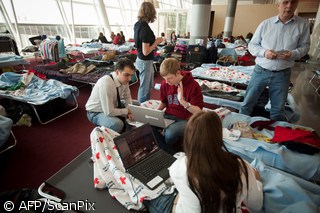And now, wearable technology. Call it wearware
Published:
28 March 2001 y., Wednesday
IBM in the jewelry business? Dutch electronics maker Philips selling street wear jackets? American high-tech start-ups creating space-age shades? Yes, yes and yes.
AT THIS YEAR’S CeBIT, IBM is showing studies of wearable computer add-ons such as a silver necklace with a hidden microphone, a lady’s display watch, earrings with speakers, and a ring whose elegant turquoise stone doubles as a nifty scroll-point mouse. Last year, Philips got together with jeans maker Levi Strauss for a limited edition of “wearable electronics garments” — jackets with a GSM mobile and an MP3 player in special pockets, with a small remote control on the front flap of the jacket and a microphone in the collar. The two devices work together, with the music turning itself off when you talk on the phone. (Available only in Europe, all 800 jackets quickly sold out). And about half a dozen companies are working on special glasses that use sophisticated optics to create screen-size images in front of your eyes.
One of the more intriguing developments in the industry is the push by some of the biggest companies into what’s become known as “wearables” — computers and accessories we can use on the go, while we’re busy doing other things. Wearables are already widespread in industry, where workers often need access to information but also need to keep their hands free. Workers building aircraft use head-mounted displays and speech-input devices for complex assembly tasks, which frees them from referring to lengthy manuals.
British Airways in experimenting with a crew of roaming check-in attendants at Heathrow’s Terminal 4, outfitted with keyboards on their forearms and a mini-display on a headset. Bell Canada sends its service technicians out to fix phone lines wearing a small computer in their pocket, a keyboard or touch-screen strapped to their wrist, and a helmet equipped with an optical display and a digital camera that beams pictures of trouble spots back to the maintenance center, wirelessly. Having quick access to precise instructions while they’re up on some telephone pole lets workers do more work in less time, says Daniel Butler, an executive at Fairfax, Virginia-based Xybernaut, maker of the wearable system BA and Bell Canada use.
Šaltinis:
NEWSWEEK
Copying, publishing, announcing any information from the News.lt portal without written permission of News.lt editorial office is prohibited.
The most popular articles
 This Saturday, 24 April, the Carlos de Amberes Foundation is hosting two conferences of European experts on the environment and sustainability and immigration policies in the EU, organised by the Allianz Cultural Foundation in the context of the Allianz Alumni Academy.
more »
This Saturday, 24 April, the Carlos de Amberes Foundation is hosting two conferences of European experts on the environment and sustainability and immigration policies in the EU, organised by the Allianz Cultural Foundation in the context of the Allianz Alumni Academy.
more »
 The Trident-Oberoi Hotel in Mumbai to reopen, following renovations after militant attacks in 2008
more »
The Trident-Oberoi Hotel in Mumbai to reopen, following renovations after militant attacks in 2008
more »
 Fresh from their wedding in Jamaica, British tourists Siobhan and David Monteith never thought for a minute that a volcano would interrupt their honeymoon.
more »
Fresh from their wedding in Jamaica, British tourists Siobhan and David Monteith never thought for a minute that a volcano would interrupt their honeymoon.
more »
 The streets of Manila filled with a colourful display on wheels, just days before the world celebrates Earth Day’s 40th anniversary.
more »
The streets of Manila filled with a colourful display on wheels, just days before the world celebrates Earth Day’s 40th anniversary.
more »
 Tens of thousands of Ugandans flocked to the hilltop palace of Africa’s youngest tribal ruler for two days of noisy parties marking a decade in power for the 18-year-old king.
more »
Tens of thousands of Ugandans flocked to the hilltop palace of Africa’s youngest tribal ruler for two days of noisy parties marking a decade in power for the 18-year-old king.
more »
 Colourful warriors leap across the stage at the 6th annual Songjiang Battle Array, in Neimen, southern Taiwan.
more »
Colourful warriors leap across the stage at the 6th annual Songjiang Battle Array, in Neimen, southern Taiwan.
more »
 Consumers benefit from greater use of European product safety alert system and more effective market surveillance.
more »
Consumers benefit from greater use of European product safety alert system and more effective market surveillance.
more »
 Representatives from all Member States are gathering for two days in Zaragoza from 15 to 16 April to discuss how migrant integration can become a driver for social cohesion in the EU.
more »
Representatives from all Member States are gathering for two days in Zaragoza from 15 to 16 April to discuss how migrant integration can become a driver for social cohesion in the EU.
more »
 The much heralded "citizens initiative" to change EU laws has been given a cautious welcome by MEPs. Under the scheme - a major innovation of the Lisbon treaty - a million people can back a plan to introduce European legislation.
more »
The much heralded "citizens initiative" to change EU laws has been given a cautious welcome by MEPs. Under the scheme - a major innovation of the Lisbon treaty - a million people can back a plan to introduce European legislation.
more »
 Football shares Europe's values of integration, solidarity and social inclusion, and can play a significant role in helping the EU to promote them, especially at the local level where clubs are part of their local communities.
more »
Football shares Europe's values of integration, solidarity and social inclusion, and can play a significant role in helping the EU to promote them, especially at the local level where clubs are part of their local communities.
more »